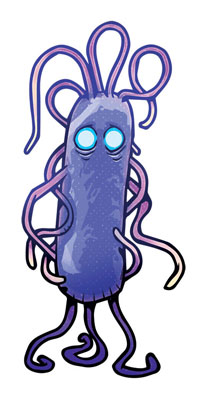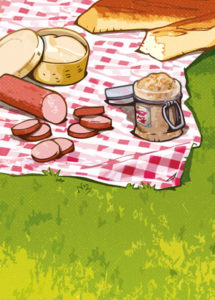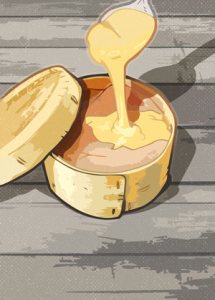By continuing your visit to this site, you accept the use of cookies.
Learn + I agreeListeria monocytogenes

Who would have thought!
The bacteria species Listeria monocytogenes can be found all over in nature: water, soil, and vegetables. Once ingested by animals it can be found in their milk and meat.
It is transmitted to humans by consuming contaminated food, often of animal origin:
- Meat and cold cuts
- Dairy products, particularly soft cheese and raw milk
- Fish


Transmission can also occur through products of plant origin, such as sprouts or bagged-salads.
Listeria monocytogenes can easily survive and even proliferate in the fridge. The only way to get rid of it is to cook it! Pay extra attention to the origin and freshness of the cold cuts, the cheese and sushi you eat.
She preys upon the weak
This bacterium causes Listeriosis, a disease that is usually benign for people in good health. People in good health usually suffer from diarrhea with some light fever and sometimes do not show any symptoms. It is different for people with weakened immune systems1 (young kids, pregnant women, transplant patients or patients undergoing chemotherapy). In young kids and old people, the infection can be serious, causing meningitis2, spepsis3 or pneumonia, with up to 20% mortality.
Typically, a pregnant woman contaminated by Listeria monocytogenes will display little if no symptoms at all. However, this infection can cause a miscarriage or the newborn baby can suffer from sepsis3 or meningitis2.
Listeriosis is due to bacteria and treatable by antibiotics5.
Don’t panic!
Except some rare occasional outbreaks (see box), listeriosis is a quite rare disease: there are about 80 cases in Switzerland every years (numbers from FOPH 2017). It only represents 1% of food infection.

Recent outbreaks in Switzerland
Listeria monocytogenes has caused a serious outbreak in the canton of Vaud in 1987. This lead to the death of 18 people out of the Mont-d’Or vacherin cheese amateurs, a local specialty cheese made out of raw milk. Since 2003, this cheese is made in Switzerland with pasteurized milk. Another outbreak happened in 2005 in the canton of Neuchâtel, which started from local tomes cheese. Two elderly died from it and two pregnant women lost their babies during the second outbreak.

Quickly seek out medical advice if you have some fever after eating suspicious food.
Immune system1 = Set of mechanisms (antibodies, white blood cells…) protecting us from infections
Meningitis2 = Inflammation of the meninges, which are the membranes surrounding the brain and spinal cord.
Sepsis3 = Serious blood and organ infection. There are two types of sepsis: bacterial (bacteremia) and or fungal (fungemia).
Pathogen4 = That causes pain (from the Greek pathos). Therefore, a pathogenic agent is a disease-causing microbe.
Antibiotic5 = A drug which allows to kill bacteria or at least to stop their growth. Antibiotics act against bacteria, but do not help treat diseases caused by viruses and parasites.
